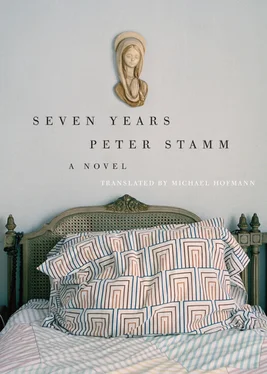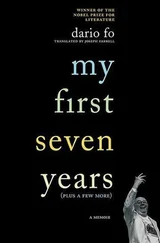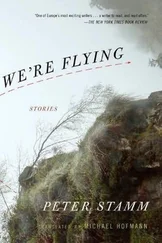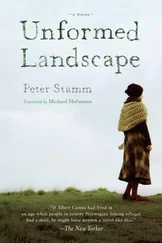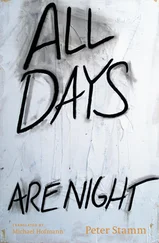* Let us see him safe, Almighty God! / Let us see him safe and well! / He dies! — He dies! — / O dreadful night!
That’s not a nice story, said Antje. Her voice sounded low and serious. I know, I said, and you’re the first person I’ve told it to. Why me?
Instead of taking the road via Traubing as I usually did, I drove along the lakefront, even though it was night, and there wasn’t much to see. There was a time I was bored by this landscape, but the longer I lived here, the more I saw its beauty. Sometimes, when Sonia was in bed already, I would go for a walk down to the Academy, and sit by the shore and think about my life, and how it could have been different. Then I would have the feeling it had all happened automatically, without any input from me, as though it had to be this way. I admired people like Antje who seemed to have their lives in their hands, and set themselves goals, and made decisions.
I parked outside the house, but Antje made no move. I don’t really feel like going in there with you, she said quietly. It’s almost twenty years ago, I said. You’re sitting here in your house, with your beautiful wife and your sweet little girl. Don’t you feel any shame? I haven’t gotten to the end of the story yet, I said. Well, I’ve heard enough for today, said Antje, and she climbed out.
I showed her to the guest bedroom, which was right beside the front door, and facing the office on the lower ground floor. Sonia had everything ready. There were towels laid out on the freshly made bed and flowers on the table by the window. She had even written a welcome card and propped it against the vase. Antje read it and set it down with a smile. Mathilda, our cat, walked in. Sophie had been pestering us for ages, and finally for her tenth birthday she was allowed to have the kitten her grandparents had promised her long before. But now, half a year later, her interest had let up noticeably, and we continually needed to remind her to look after her pet. Mathilda strolled through my legs and looked up at Antje, who was taking her toiletries from her overnight bag. You have your own bathroom, I said, here on the right. Will you remove the cat, please? said Antje. I asked her if she didn’t like animals. I like wild animals, not pets.
I said good night and turned to leave. Wait, said Antje, and dropped onto her bed. You didn’t answer my question. Why tell me all this? We hardly know each other. Maybe that’s the reason, I said. Do you remember when you showed me your paintings back then? Antje made a doubtful face. You didn’t like them. Actually, no one liked them, not even me. You said I was too young for them, I said, but that wasn’t true. I recognized myself in your copulating chimeras. I felt trapped, maybe that’s why I didn’t want to see your pictures. Aren’t you making things a teeny bit simple for yourself? asked Antje. You behave like a swine, and then you blame your inner beast. I’m not buying that. Maybe I thought, because you’re an artist, you’d understand, I said. Antje stopped to think. She had some understanding for craziness, but she couldn’t understand what I’d done. You had to be able to tell the difference between fiction and reality. Imagine someone doing that to your daughter. I said that wasn’t fair, Sophie was still a child. That’s not the point, said Antje.
Finally we said good night, and I went upstairs to Sophie’s room. The only light was from a small blue night-light, in which Sophie’s face looked very calm. While I gazed at her, she quickly furrowed her brow, and I wondered what was going on in her head, what she could have been dreaming about. Sometimes she came into our room, I would wake up for some reason to find her standing by our bed and staring at me with a frightened expression. When I sent her back she would say she’d had a bad dream. Then she would tell exotic stories about wild animals and wicked men, and sometimes great big destructive machines, and I would tell her to try and think of something else, something pretty. I can’t, she would say.
I went into the bathroom and got changed. When I lay down, Sonia woke briefly, gave me a kiss, and went straight back to sleep. I thought of the pictures I’d taken of her asleep, and that she’d seen later. That was the first time we’d kissed, on that little island in front of the port at Marseilles. It all seemed terribly long ago.
When I got to the parking lot, Sonia was already there. She got out, said hello, and opened the trunk. There was hardly any room for my duffle bag next to her huge wheeled suitcase. I asked her what she’d packed, I’d thought we were only going for a couple of days. Things I need, she said, and a few books and my Rolleiflex. Did you bring a camera? I don’t need a camera, I’ve got eyes in my head and a good memory. You’re just lazy, Sonia said.
It was a cool morning, everything felt clean and fresh. It was due to get hot again by noon, but by then we’d be in the mountains, Sonia promised. She’d thought of everything, she had all the necessary maps with her, and water and a thermos of coffee. Some sandwiches were in a picnic basket on the back seat. We’re going to go via the San Bernardino Pass, said Sonia, past Milan and along the Ligurian coast. It’s a pretty route. I said I’d be glad to take turns driving. We’ll see, she said.
It really was a lovely drive. We had never spent so much time together, and we got on like a house on fire. Sonia talked about Le Corbusier, she knew everything about him and his work. She asked me what I had against him. Nothing, I said, I just don’t like him. There’s something conceited about his buildings. I always get the feeling they’re out to turn me into an ideal man. Have you ever been inside any of his buildings? No, I said, but I’ve seen loads of pictures. Sonia said, pictures weren’t enough, the essence of Le Corbusier wasn’t in the facades, but in the rooms. Anyway, what could be bad about a building that improved the people who lived in it? I said, people have a history that you have to respect. Attempts to create a better man were at best misguided and at worst had led to atrocious crimes. What did Le Corbusier do in the war, by the way? Sonia said she wasn’t exactly sure, but he certainly hadn’t been a fascist. In twenty years’ time no one will speak about Deconstructivism anymore, but Le Corbusier will still be around.
Later we talked about our final projects, and when I told Sonia I’d started mine all over again, she looked at me in amazement. I told her about my new ideas. That the structure should emerge from the paths and grow, like a plant, that the halls shouldn’t just be the empty space between walls, but atmospheric bodies, sculptures of light and shade. While I spoke, I got the feeling I hadn’t done so badly over the last week. Of course it’s a waste of time, now that I’ve got my degree in my pocket. Sonia asked me if I’d like to work with her on the day-care design for the contest. That surprised me, because a day or two earlier she’d rejected all my suggestions, and basically we had completely different ideas about architecture. Do you really think we’d make a good team? You make a more interesting class of mistake, said Sonia, and laughed.
At lunchtime we were at the pass. We parked the car and ate our sandwiches. Then we lay in the sun, until Sonia said we’d better get going. I asked if she wanted me to take over, but she shook her head, maybe later, she didn’t feel tired yet. I wasn’t too unhappy about that, because I wasn’t an experienced driver, and I enjoyed sitting idly next to Sonia and staring out the window at the passing scenery.
Somehow we came to speak about Rüdiger. I asked Sonia why she’d broken up with him. He broke up with me. That I don’t understand, I said, how anyone could leave a woman like you. Sonia quickly turned to look at me, and smiled ironically. Tell him that.
Читать дальше
